Whilst Dover in Kent is the nearest port to the French coast, Newhaven on the East Sussex coast provides the shortest land route to London, the main destination for the illicit cargos. In between these two busy ports are many little bays and inlets which, historically were the favoured landing areas for generations of smugglers. On our second day’s bike ride from Newhaven we went past several of these, the most important being Cuckmere Haven.
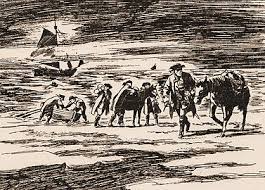
For example a report states:
“In September 1783 gangs of 200 or 300 men arrived at Cuckmere Haven twice within a week, and defiantly carried off their goods, despite opposition from the customs man, and the fact that the sea was extremely rough on the earlier occasion. A contemporary newspaper reported that it was quite common to see a dozen smuggling vessels lying off the coast in broad daylight at this time”.
One such was the Alfriston Gang, which as I mentioned previously on our first day’s bike ride thru the village – (https://anerleybc.org/1/stormy-south-downs-and-sussex-coast/) operated out of Ye Olde Smugglers Inn, and which really was used by smugglers!
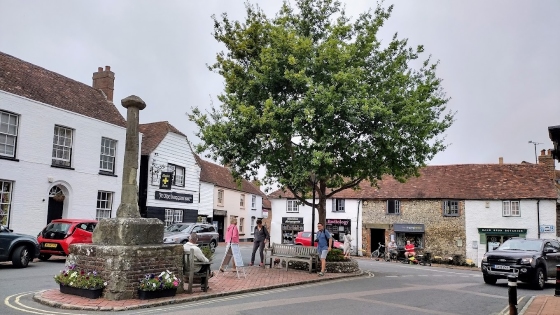
Originally a butchers premises, the owner Stanton Collins, seems to have used the house to great advantage as the headquarters of one of the East Sussex gangs.
There are many stories about smuggling along this part of the Sussex coast. Most based upon fact, but often exaggerated or totally false. For example, this is one such story – true or false – relating to the murder of a customs man at Cuckmere Haven by the Alfriston gang.
“Fearing that the officers attentions would interfere with their night time landing, the gang moved the lumps of white chalk that the officer used as way-markers for his moonlight sorties along the cliff-edge. Instead of leading him safely along the coast path, the stones lured the poor man over the parapet. Hearing his cries as he tumbled from the precipice, the gang emerged from hiding, only to find the man desperately hanging by his fingertips. Deaf to pleas for mercy, one of the gang cynically trod on their adversary’s fingertips, sending him tumbling to the rocks below.”
Continuing on our second day’s ride, we took a minor road from Alfriston to Polegate, and another back towards the coast and Birling Gap. This took us through the little old village of Jevington with it’s fine example of an 11th century Norman church. This as expected has an interesting history, but not what you might not expect!
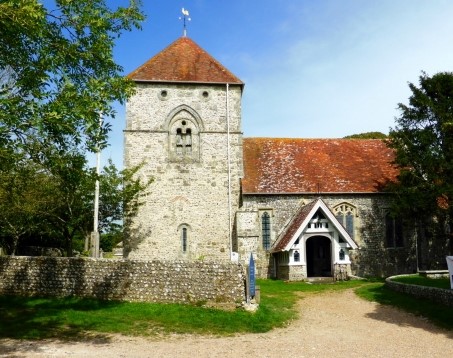
The village records show that from the time of the Reverend William Carr in 1670, until the 19th century, the village parsons turned a blind eye, or actively aided, the activities of the villagers who were very active on the beach near Birling Gap! Birling Gap was our next destination and presented a climb for us to pedal up, to join and take the main A 259, here at Friston.
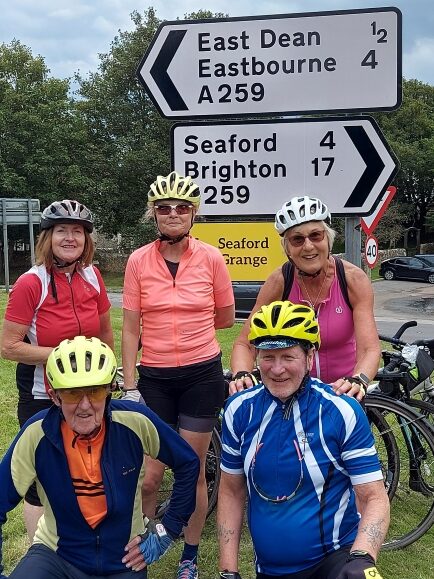
Directly opposite is a trackway named Crowlink Lane, which in times past lead down to the beach used by the smugglers. Such was the quantity of Dutch Gin landed here, that ‘Genuine Crowlink’ was a guarantee of a good drink and landlords even chalked this slogan on the gin barrels as an advertisement!
However coastal erosion now makes access difficult. So let us head back to Jevington, 200 years ago when access was easy, and have a glass of ‘Genuine Crowlink’ in the local pub, the Eight Bells. This pub was the centre of the smuggling activities, with a little help from the good Cleric. From the pub, underground tunnels led to the church rectory which had large cellars that formed a convenient storage spot. And the nearby church also, conveniently, had a very large cellar from which another tunnel provided access to tombs in the churchyard, reputedly having when necessary, been used to store contraband.
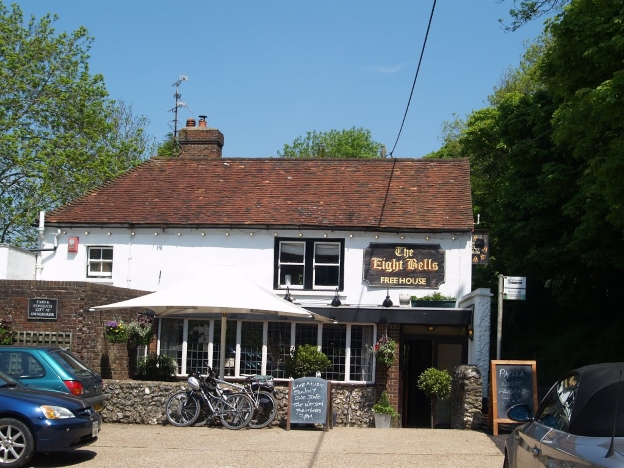
The landlord then was James Petit known as Jevington Jigg, whose main occupation apparently was as as a leader of the Jevington smugglers. He kept good company, being a crony of Brook (the horse thief), Howell (the tailor), Rook (the highwayman) and Cream Pot Tom (who met his end at the gallows). But his nocturnal activities on the beach brought him to the notice of the authorities and in 1788 a body of armed constables went to the inn. The story goes that Jigg was playing cards with his friends and on hearing that the inn was surrounded quickly donned a bonnet, cloak, petticoat and spurred boots, and so disguised, tried to make good his escape. But his heavy boots, which showed beneath the petticoats, gave the game away. The story does not say if he was convicted for smuggling, but finally in the summer of 1799 he was convicted of horse stealing at Salisbury and condemned to death. The sentence was reduced to transportation for 14 years at Australia’s Botany Bay – and there in all probability he died.
But the stories of smuggling along the Sussex coast did not end there, but continue to this day. Below was a newspaper report today – 26th Oct 2023. Armed police retrieve smuggled cocaine from a Sussex beach!
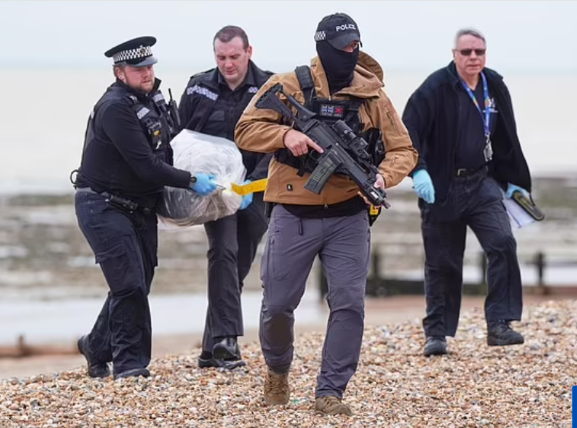
Thursday, Oct 26th 2023 3PM
EXCLUSIVE: Why does cocaine keep washing up on Britain’s south coast? How ‘mother ships’ laden with drugs from South America and handover hauls to UK based smugglers are behind spate of discoveries on beaches of Sussex, Isle of Wight and Dorset
A large haul of the drug – believed to be worth around £2million – washed up on a Sussex beach on Monday, the latest in a string of seaside discoveries.
Armed police sealed off a large section of the shore in Goring, West Sussex, after the bag containing 30kg of cocaine was found by a member of the public.
A large haul of the drug – believed to be worth around £2million – washed up on a Sussex beach on Monday, the latest in a string of seaside discoveries.
But what is behind this latest spate of cocaine on Britain’s beaches? To find out more about this interesting and detailed story see: https://www.dailymail.co.uk/news/article-12666883/Why-does-cocaine-washing-Britains-south-coast-mother-ships-laden-drugs-South-America-handover-hauls-UK-based-smugglers-spate-discoveries-beaches-Sussex-Isle-Wight-Dorset.html
Des.
